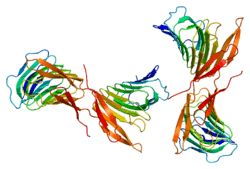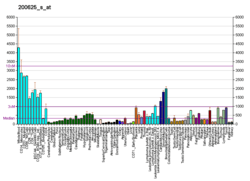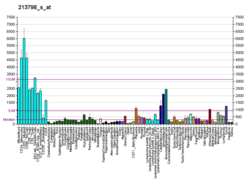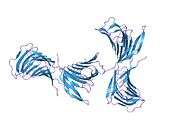CAP1
Adenylyl cyclase-associated protein 1 is an enzyme that in humans is encoded by the CAP1 gene.[4][5][6]
The protein encoded by this gene is related to the S. cerevisiae CAP protein, which is involved in the cyclic AMP pathway. The human protein is able to interact with other molecules of the same protein, as well as with CAP2 and actin.[6]
Interactions
CAP1 has been shown to interact with ACTG1[7] and CAP2.[5]
gollark: Also, "throw money at people to try and stop them developing competitors" sounds like something which would be... obvious and visible and probably not really work.
gollark: I doubt Elon Musk would stop working on SpaceX or something if they just threw tons of money at him.
gollark: The issue is the public being IDIOTS about nuclear power.
gollark: It wouldn't cost THAT much to deploy some things.
gollark: Governments are total bees.
References
- GRCm38: Ensembl release 89: ENSMUSG00000028656 - Ensembl, May 2017
- "Human PubMed Reference:". National Center for Biotechnology Information, U.S. National Library of Medicine.
- "Mouse PubMed Reference:". National Center for Biotechnology Information, U.S. National Library of Medicine.
- Matviw H, Yu G, Young D (Nov 1992). "Identification of a human cDNA encoding a protein that is structurally and functionally related to the yeast adenylyl cyclase-associated CAP proteins". Mol Cell Biol. 12 (11): 5033–40. PMC 360436. PMID 1406678.
- Hubberstey A, Yu G, Loewith R, Lakusta C, Young D (Apr 1997). "Mammalian CAP interacts with CAP, CAP2, and actin". J Cell Biochem. 61 (3): 459–66. doi:10.1002/(SICI)1097-4644(19960601)61:3<459::AID-JCB13>3.0.CO;2-E. PMID 8761950.
- "Entrez Gene: CAP1 CAP, adenylate cyclase-associated protein 1 (yeast)".
- Hubberstey, A; Yu G; Loewith R; Lakusta C; Young D (Jun 1996). "Mammalian CAP interacts with CAP, CAP2, and actin". J. Cell. Biochem. UNITED STATES. 61 (3): 459–66. doi:10.1002/(SICI)1097-4644(19960601)61:3<459::AID-JCB13>3.0.CO;2-E. ISSN 0730-2312. PMID 8761950.
External links
- Human CAP1 genome location and CAP1 gene details page in the UCSC Genome Browser.
Further reading
- Yu G, Swiston J, Young D (1994). "Comparison of human CAP and CAP2, homologs of the yeast adenylyl cyclase-associated proteins". J. Cell Sci. 107 (6): 1671–8. PMID 7962207.
- Maruyama K, Sugano S (1994). "Oligo-capping: a simple method to replace the cap structure of eukaryotic mRNAs with oligoribonucleotides". Gene. 138 (1–2): 171–4. doi:10.1016/0378-1119(94)90802-8. PMID 8125298.
- Suzuki Y, Yoshitomo-Nakagawa K, Maruyama K, et al. (1997). "Construction and characterization of a full length-enriched and a 5'-end-enriched cDNA library". Gene. 200 (1–2): 149–56. doi:10.1016/S0378-1119(97)00411-3. PMID 9373149.
- Moriyama K, Yahara I (2003). "Human CAP1 is a key factor in the recycling of cofilin and actin for rapid actin turnover". J. Cell Sci. 115 (Pt 8): 1591–601. PMID 11950878.
- Strausberg RL, Feingold EA, Grouse LH, et al. (2003). "Generation and initial analysis of more than 15,000 full-length human and mouse cDNA sequences". Proc. Natl. Acad. Sci. U.S.A. 99 (26): 16899–903. Bibcode:2002PNAS...9916899M. doi:10.1073/pnas.242603899. PMC 139241. PMID 12477932.
- Gevaert K, Goethals M, Martens L, et al. (2004). "Exploring proteomes and analyzing protein processing by mass spectrometric identification of sorted N-terminal peptides". Nat. Biotechnol. 21 (5): 566–9. doi:10.1038/nbt810. PMID 12665801.
- Ota T, Suzuki Y, Nishikawa T, et al. (2004). "Complete sequencing and characterization of 21,243 full-length human cDNAs". Nat. Genet. 36 (1): 40–5. doi:10.1038/ng1285. PMID 14702039.
- Dodatko T, Fedorov AA, Grynberg M, et al. (2004). "Crystal structure of the actin binding domain of the cyclase-associated protein". Biochemistry. 43 (33): 10628–41. doi:10.1021/bi049071r. PMID 15311924.
- Gerhard DS, Wagner L, Feingold EA, et al. (2004). "The status, quality, and expansion of the NIH full-length cDNA project: the Mammalian Gene Collection (MGC)". Genome Res. 14 (10B): 2121–7. doi:10.1101/gr.2596504. PMC 528928. PMID 15489334.
- Rual JF, Venkatesan K, Hao T, et al. (2005). "Towards a proteome-scale map of the human protein-protein interaction network". Nature. 437 (7062): 1173–8. Bibcode:2005Natur.437.1173R. doi:10.1038/nature04209. PMID 16189514.
- Fautsch MP, Vrabel AM, Johnson DH (2006). "The identification of myocilin-associated proteins in the human trabecular meshwork". Exp. Eye Res. 82 (6): 1046–52. doi:10.1016/j.exer.2005.09.016. PMID 16289162.
- Oh JH, Yang JO, Hahn Y, et al. (2006). "Transcriptome analysis of human gastric cancer". Mamm. Genome. 16 (12): 942–54. doi:10.1007/s00335-005-0075-2. PMID 16341674.
- Gregory SG, Barlow KF, McLay KE, et al. (2006). "The DNA sequence and biological annotation of human chromosome 1". Nature. 441 (7091): 315–21. Bibcode:2006Natur.441..315G. doi:10.1038/nature04727. PMID 16710414.
- Beranova-Giorgianni S, Zhao Y, Desiderio DM, Giorgianni F (2006). "Phosphoproteomic analysis of the human pituitary". Pituitary. 9 (2): 109–20. doi:10.1007/s11102-006-8916-x. PMID 16807684.
- Garewal G, Das R, Awasthi A, et al. (2007). "The clinical significance of the spectrum of interactions of CAP+1 (A-->C), a silent beta-globin gene mutation, with other beta-thalassemia mutations and globin gene modifiers in north Indians". Eur. J. Haematol. 79 (5): 417–21. doi:10.1111/j.1600-0609.2007.00958.x. PMID 17900295.
This article is issued from Wikipedia. The text is licensed under Creative Commons - Attribution - Sharealike. Additional terms may apply for the media files.





